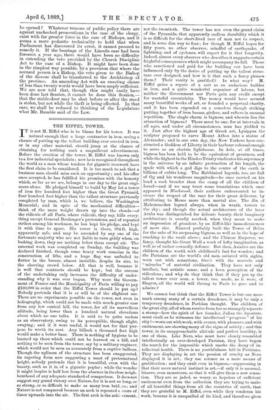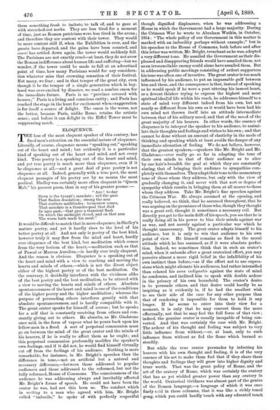THE EIFFEL TOWER.
ITis not M. Eiffel who is to blame for his tower. It was natural enough that a large contractor in iron, seeing a chance of putting up the tallest building ever erected in iron, or in any other material, should jump at the chance of obtaining for nothing such a magnificent advertisement. Before the erection of the tower, M. Eiffel was known only to a few industrial specialists ; now he is recognised throughout the world as a man whose tenders for gigantic ironwork have the first claim to be considered. It is too much to ask that a business man should miss such an opportunity ; and his offer once accepted, he has fulfilled his promises with the honesty which, so far as we see, belongs in our day to the great engi- neers alone. He pledged himself to build by May 1st a tower of iron five hundred feet higher than the Great Pyramid, four hundred feet higher than the tallest structure previously completed by man, which is, we believe, the Washington Memorial; and in spite of the mechanical difficulties— think of the mere weight drawn up into the clouds—of the ridicule of all Paris, where ridicule, they say, kills every- thing except General Boulanger's pretensions, and of repeated strikes among his workmen, he has kept his pledge, and kept it with time to spare. His tower is there, 984ft. high, apparently safe, and may be ascended by any one of the fortunate majority who are not liable to turn giddy when, on looking dawn, they see nothing below them except air. The external work was completed on Sunday, the building was declared finished, though some heavy work remains in the construction of lifts, and a huge flag was unfurled to flutter in the breeze, almost invisible, despite its size, to the cheering crowd below. All that is well, because it is well that contracts should be kept ; but the success of the undertaking only increases the difficulty of under- standing why it was ever begun. Why were the Govern- ment of France and the Municipality of Paris willing to pay 2160,000 in order that the Eiffel Tower should be put up ? Nobody pretends that it is or will be of the slightest use. There are no experiments possible on the tower, not even in heliography, which could not be made with much greater ease from any low conical hill, the tower, for all its marvellous altitude, being lower than a hundred natural elevations about which no one talks. It is said to be quite useless as an observatory, owing to its perceptible, though slight, swaying; and if it were useful, it would not for that pur- pose be worth its cost. Any hillock a thousand feet high would make a better base. There is nothing of hygiene to be learned up there which could not be learned on a hill, and nothing to be seen from the tower, say by a military engineer, which would not be seen as accurately from a captive balloon. Though the ugliness of the structure has been exaggerated, its tapering form now suggesting a mast of preternatural height, nobody pretends that it is beautiful, even with the beauty, such as it is, of a gigantic poplar ; while the wonder it might inspire is half lost from the absence in its close neigh- bourhood of any adequate standard of comparison. It does not suggest any grand victory over Nature, for it is not so long, or so strong, or so difficult to make as many iron brides; and Nature is not conquered because an arch is repeated a score of times upwards into the air. The first arch is the a,chit. vement, not the twentieth. The tower has not even the grand claim of the Pyramids, that apparently endless durability which it is so difficult for the short-lived race of man not to respect, and in some dim way to fear ; for though M. Eiffel hopes for fifty years, no other observer, mindful of earthquake, of lightning, and of cyclones, will expect for it that longevity. Indeed, almost every observer who describes it suggests certain frightful consequences which might accompany its fall. Those who sanctioned and paid for the building can have been influenced only by the desire of putting up the tallest struc- ture ever designed, and how is it that such a fancy pleases them P Their vanity is gratified? In what way P M. Eiffel gains a repute of a sort as an audacious builder in iron, and a quite wonderful organiser of labour, but neither the Government nor Paris gain any credit except for wasteful eccentricity. The money would have secured many beautiful works of art, or founded a perpetual charity, and it has been expended on a senseless though striking putting together of iron beams, girders, and rafters in unusual repetition. The single charm is bigness, and wherein lies the attraction of bigness ? There must be one, for at intervals in all ages, and under all circumstances, man has yielded to it. Just after the highest age of Greek art, Lysippns the sculptor proposed to carve Mount Athos into a statue of Alexander; and in our own day, the New Yorkers have con- structed a Goddess of Liberty in their harbour colossal enough to serve as an electric lighthouse. In Asia, at all times, bigness has been held to be the equivalent of greatness, and while the highest in the Hindoo Trinityvindicates his supremacy in the universe by an infinite protraction of his length, the spade with which a god digs to the centre of the earth is billions of cubits long. The Rabbinical legends, too, are full of Og and his wondrous magnitude—he once carried on his head a rock broader than the camp of all the children of Israel—and if we may trust some translations which once appeared in Blackwood, their authors endeavoured to in- crease the respect of the race for their great deliverer, by attributing to Moses more than mortal size. The Jin. of Mahommedan legend always, when in wrath, towers to the sky ; and though the actual architecture of the later Arabs was distinguished for delicate beauty, their imaginary architecture is usually marked, when they mean to make an impression of grandeur, by an Eiffel-like immoderateness of mere size. Nimrod probably built the Tower of Belus for the sake of its surpassing bigness, as well as in the hope of reaching to the vault above ; and the Chinese Emperor, we fancy, thought his Great Wall a work of lofty imagination, as well as of rather cowardly defence. But then, Asiatics are the children of the world, with childhood's lust for wonder; and the Parisians are the world's old men, satiated with sights, worn out with sensations, blares with the marvels and " miracles " of material civilisation. They have not only intellect, but artistic sense, and a keen perception of the ridiculous ; and why do they think that if they put up the tallest tower ever seen, a tower, too, made, as it were, of filagree, all the world will throng to Paris to gaze and to admire ?
We cannot but think that the Eiffel Tower is but one more mark among many of a certain decadence, it may be only a temporary decadence, in Parisian thought. The children of the great city, all of whom receive from her so strangely separate a stamp—how the spirit of her founder, Julian the Apostate, must exult as he witnesses the intellectual " progress " of his city I—worn out with work, with events, with pleasure, and with excitement, are showing many of the signs of satiety ; and this tower, in its unapproachable altitude and perfect inutility, is one of them. Like Nero, who must have closely resembled intellectually an over-developed Parisian, they have begun the search for the impossible which marks the decay of in- tellectual health. There is no youthfulness left in Parisians. They are displaying in art the passion of cruelty as Nero displayed it in act ; they use science as a mere means of gratification ; and they exult even in bigness,—suppressing in that their more natural instinct in art,—if only it is unusual, bizarre, even monstrous, so that it will give them a new sensa- tion. They are so jaded, so weary, so hopeless of sufficient excitement even from the collection they are trying to make of all beautiful things from all the countries of earth, that they are grateful to M. Eiffel, even while they condemn his work, because it is unequalled of its kind, and therefore gives
them something fresh to imitate, to talk of, and to gaze at with stretched-out necks. They are less tired for a moment of time, just as Roman patricians were less tired in the arena; and therefore they are content with their tower. They would be more content still if, when the Exhibition is over, and the guests have departed, and the gains have been counted, and ennui has settled down again, the tower would suddenly fall. The Parisians are not exactly cruel—at least, they do not avow the Roman indifference about human life and suffering—but we wonder, if the tower could be made to fall at an advertised point of time, how many Parisians would for any considera- tion whatever miss that crowning sensation of their festival. Not many, we fear ; and in that temper of the great city, even though it be the temper of a single generation which in boy- hood• was over-excited by disaster, we read a sombre omen for the immediate future. Paris is no "province covered with houses ;" Paris is a living and conscious entity; and Paris has .reached the stage in the hunt for excitement when exaggeration is for itself a source of delight. The omen is the worse, not the better, because Paris, unlike Rome, retains the artistic sense ; and before it can delight in the Eiffel Tower must be suppressing much.



































 Previous page
Previous page